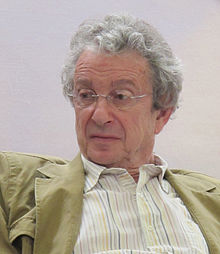- C. K. Williams
-
Charles Kenneth Williams (b. November 4, 1936) is an American poet. Senior poet Paul Muldoon has described him as “one of the most distinguished poets of his generation.” [1]
Contents
Biography
Williams grew up in Newark, New Jersey and graduated from Columbia High School in Maplewood. He later studied at Bucknell University and the University of Pennsylvania. During this time, he spent five lonely months in Paris trying to write before realizing he knew nothing about poetry, noting in a New York Times article, that "It was an incredibly important time, not much happened and yet my life began then. I discovered the limits of loneliness." He returned to Pennsylvania determined to learn something of poetry and began his writing career. He launched himself as a vehement anti-war poet at during the U. S. conflicts in southeast Asia. His first collection, Lies, was politically engaged; 1972 saw his first collection of explicitly antiwar poems.[2]
He began teaching in 1975, first at a Y.M.C.A. in Philadelphia, later at Drexel University, and then at the Franklin & Marshall College.
He met his present wife, Catherine Mauger, a jeweller of French descent, in 1973, and they have a son who is now a noted painter. Williams also has a daughter, born in 1969, from an earlier marriage.
He is known for a poetic style involving long lines of unrhyming free verse.[3] His subjects are modern and predominately urban, his voice that of an 'outspoken liberal.' Anti-war themes pervade his entire writing career. He was highly critical of the Bush administration and the Iraq war, stating in 2005 that "The unreasonableness of war, the killing of children, drives me to distraction. My moral system grows out of this. There has never been a moment in my life when I felt we were in so much danger. I am a father and a grandfather. I have three grandsons. I am afraid for them." [4][2] Williams is an acclaimed translator, notably of Sophocles' Women of Trachis and Euripides' The Bacchae in the classic canon and more contemporarily, of the Polish poet Adam Zagajewski and the French writer Francis Ponge.
He has won nearly every major poetry award. Flesh and Blood won the National Book Critics Circle Award. Repair (1999) won the 2000 Pulitzer Prize for Poetry, was a National Book Award finalist and won the Los Angeles Times Book Prize. The Singing won the National Book Award in 2003. In 2005, he was awarded the Ruth Lilly Poetry Prize.
Since 1996, he has taught in the creative writing program at Princeton University, and he divides his time between Princeton and France.[2]
Awards and honors
- 1974 Guggenheim Fellowship
- 1987 National Book Critics Circle Award for Flesh and Blood
- 1992 Lila Wallace-Reader’s Digest Award
- Pushcart Prize
- 1998 PEN/Voelcker Award for Poetry
- 1999 American Academy of Arts and Letters Award
- 2000 Pulitzer Prize for Poetry for Repair
- 2000 Los Angeles Times Book Prize for Repair
- 2003 National Book Award for The singing
- 2003 American Academy of Arts and Letters Fellowship
- 2005 Ruth Lilly Poetry Prize
Books
- Lies - 1969
- Tar - 1983
- Flesh and Blood - 1987
- The Bacchae of Euripides
- A Dream of Mind - 1992
- I am the Bitter Name - 1992
- Selected Poems - 1994
- With Ignorance - 1997
- The Vigil - 1997
- Poetry and Consciousness - 1998
- Repair - 1999
- Misgivings: My Mother, My Father, Myself - 2000
- The Singing - 2003
- Collected Poems - 2006
- On Whitman - 2010
- Wait, Farrar, Straus (New York, NY), 2010.
References
- ^ Poetry foundation - William's biography accessed 2010-02-27
- ^ a b c Hedges, Chris (2005-01-13). "Poet Marshals His Moral Passion Against the War". The New York Times. http://www.nytimes.com/2005/01/13/nyregion/13profile.html. Retrieved 2010-02-27.
- ^ Poetry Archive Williams synopsis (UK)
- ^ Eder, Richard (2006-12-25). "A Poet Watches Himself as He Watches the World". The New York Times. http://www.nytimes.com/2006/12/25/books/review/25eder.html?_r=1. Retrieved 2010-02-27.
External links
- Poetry Foundation (U.S) biography accessed 2010-02-10
- Poetry Archive (U.K) biography and audio poetry recordings accessed 2010-02-10
- A Poet Watches Himself as He Watches the World New York Times article, December 25, 2006 accessed 2010-02-27
- Poet Marshals His Moral Passion Against the War New York Times article January 13, 2005 accessed 2010-02-27
- C.K. Williams reading his poetry at TED conference accessed 2010-02-27
- Poetry.LA's video of C.K. Williams' reading at the 3rd Area Reading Series, PHARMAKA Gallery, Los Angeles, 3/19/2009
- The National Book Foundation C.K. Williams's acceptance speech for the 2003 Poetry Award for The Singing, reading his poem "The Doves." Accessed 11/30/2010
- 'Song of Himself', review of On Whitman in the Oxonian Review
Pulitzer Prize for Poetry (1976–2000) - John Ashbery (1976)
- James Merrill (1977)
- Howard Nemerov (1978)
- Robert Penn Warren (1979)
- Donald Justice (1980)
- James Schuyler (1981)
- Sylvia Plath (1982)
- Galway Kinnell (1983)
- Mary Oliver (1984)
- Carolyn Kizer (1985)
- Henry S. Taylor (1986)
- Rita Dove (1987)
- William Meredith (1988)
- Richard Wilbur (1989)
- Charles Simic (1990)
- Mona Van Duyn (1991)
- James Tate (1992)
- Louise Glück (1993)
- Yusef Komunyakaa (1994)
- Philip Levine (1995)
- Jorie Graham (1996)
- Lisel Mueller (1997)
- Charles Wright (1998)
- Mark Strand (1999)
- C. K. Williams (2000)
- Complete list
- (1922–1950)
- (1951–1975)
- (1976–2000)
- (2001–2025)
Categories:- 1936 births
- Living people
- American poets
- Members of the American Academy of Arts and Letters
- People from Newark, New Jersey
- Princeton University faculty
- Pulitzer Prize for Poetry winners
- University of Pennsylvania alumni
Wikimedia Foundation. 2010.

